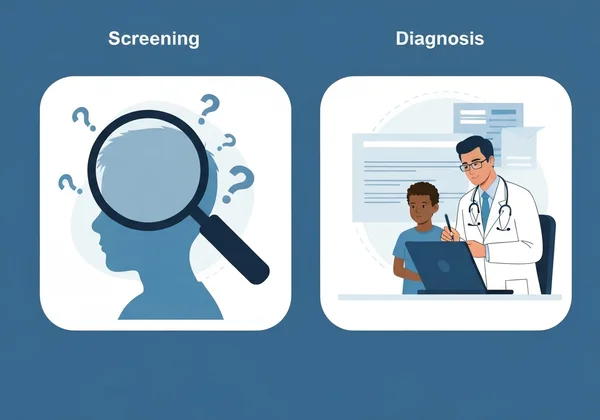Comprendere il punteggio elevato del test di screening per l'autismo di tuo figlio: una guida per i genitori dopo lo screening
November 11, 2025 | By Seraphina Rivers
Ricevere un punteggio elevato allo screening per l'autismo di un bambino può risultare opprimente. Spesso può scatenare un turbinio di emozioni: confusione, preoccupazione e un urgente bisogno di risposte. Se ti stai chiedendo cosa fare dopo lo screening per l'autismo?, sappi che non sei solo e che hai compiuto un primo passo proattivo. Questa guida è qui per offrire un percorso calmo, chiaro e concreto, aiutandoti a trasformare l'incertezza in un percorso strutturato verso la comprensione e il supporto. Le informazioni iniziali che hai ottenuto sono preziose, e i prossimi passi consistono nel raccogliere ulteriori dati con la guida di professionisti.
Uno screening online è un ottimo punto di partenza per esplorare i modelli di sviluppo di tuo figlio. Aiuta a organizzare le tue osservazioni in un quadro più chiaro. Sebbene non sia una diagnosi, serve come un importante indicatore, indicandoti il percorso giusto per ottenere risposte definitive e supporto per tuo figlio. Percorriamo insieme questo viaggio, un passo alla volta.
Cosa fare dopo che tuo figlio ha ottenuto un punteggio elevato in un test per l'autismo
Un punteggio elevato è un segnale per indagare ulteriormente, non una conclusione. Le tue azioni immediate dovrebbero concentrarsi sulla comprensione dei risultati, sulla comunicazione efficace e sulla preparazione per la fase successiva. Questo è un momento di preparazione calma e metodica, che ti consentirà di affrontare con maggiore sicurezza le conversazioni con i professionisti. L'obiettivo è costruire solide basi di conoscenza e osservazioni documentate.
Comprendere la differenza tra screening e diagnosi
È fondamentale comprendere la differenza tra uno screening e una diagnosi. Uno strumento di screening, come il test online per l'autismo che potresti aver utilizzato, identifica potenziali caratteristiche o tratti associati al Disturbo dello Spettro Autistico (DSA). È un passo preliminare finalizzato a indicare se è raccomandata una valutazione più approfondita e formale. Consideralo come un rilevatore di fumo; ti avvisa della possibilità di un incendio ma non lo conferma.
Una diagnosi formale, tuttavia, può essere fatta solo da un professionista sanitario qualificato. Questo processo è completo e coinvolge l'osservazione clinica, interviste sulla storia dello sviluppo e valutazioni diagnostiche standardizzate. Un punteggio elevato allo screening significa semplicemente che tuo figlio presenta abbastanza tratti da giustificare una valutazione professionale.

Comunicare con il partner e la famiglia
Ricevere questi risultati può essere un argomento delicato all'interno di una famiglia. Affronta le conversazioni con il tuo partner o altri caregiver con calma, cercando di presentare un fronte comune. Condividi i risultati dello screening non come un'etichetta definitiva, ma come un'informazione che suggerisce di fare il passo successivo insieme. Presentalo come una misura proattiva per assicurarti che tuo figlio riceva tutto il supporto di cui potrebbe aver bisogno per prosperare.
Concentrati su obiettivi condivisi: la felicità, il benessere e lo sviluppo di tuo figlio. Evita toni speculativi o allarmistici. Potresti dire qualcosa del tipo: "Ho usato uno strumento di screening per comprendere meglio alcuni dei comportamenti che abbiamo notato, e i risultati suggeriscono che sarebbe una buona idea parlare con uno specialista."
Documentare le osservazioni per riferimento futuro
Le tue osservazioni quotidiane sono dati preziosi per una valutazione professionale. Inizia un quaderno dedicato o un documento digitale per annotare esempi specifici dei comportamenti, dei punti di forza e delle sfide di tuo figlio. Annota le sue interazioni sociali, i metodi di comunicazione (verbali e non verbali), le modalità di gioco, le sensibilità sensoriali e qualsiasi comportamento ripetitivo.
Sii specifico. Invece di scrivere "ha problemi con gli amici", scrivi "Durante un appuntamento di gioco martedì, è rimasto in disparte dal gruppo e ha allineato le sue macchinine invece di unirsi al loro gioco." Questo dettagliato registro delle osservazioni fornisce prove concrete che saranno estremamente utili durante una valutazione professionale.

Navigare nel percorso diagnostico per l'autismo infantile
Una volta elaborati i risultati iniziali dello screening, la fase successiva prevede la ricerca di una valutazione formale. Questo è il percorso ufficiale per comprendere il profilo neuroevolutivo unico di tuo figlio. Sapere a chi rivolgersi e cosa aspettarsi può ridurre significativamente l'ansia associata a questo processo. Ricorda, una diagnosi non è un'etichetta, ma una chiave per accedere a supporto e risorse su misura.
Chi può diagnosticare l'autismo nei bambini?
È importante consultare professionisti che abbiano una formazione specializzata nei disturbi dello sviluppo. Cerca un pediatra dello sviluppo, uno psicologo infantile, uno psichiatra infantile o un neurologo pediatrico. Questi specialisti sono formati per condurre valutazioni complete per il DSA. Il tuo pediatra di base è un ottimo primo riferimento; può fornirti un rinvio a uno specialista appropriato nella tua zona.
Quando cerchi un professionista, non esitare a chiedere della loro esperienza con le valutazioni del DSA. Desideri un team che non sia solo qualificato ma anche compassionevole e che sia in sintonia con la tua famiglia.

Prepararsi agli appuntamenti per la valutazione professionale
La tua preparazione può rendere il processo di valutazione più scorrevole ed efficace. Raccogli tutti i documenti pertinenti, inclusa l'anamnesi evolutiva di tuo figlio, eventuali rapporti di insegnanti o terapisti e il tuo registro dettagliato delle osservazioni. Avere queste informazioni organizzate aiuterà il clinico a ottenere un quadro completo di tuo figlio.
Prepara un elenco di domande che vuoi porre allo specialista. Cosa comporta il processo di valutazione? Quanto tempo ci vorrà per ottenere i risultati? Quali sono i possibili esiti? Essere preparati ti aiuta a diventare un protagonista attivo e informato nella cura di tuo figlio. Utilizzare uno strumento come uno screening gratuito per l'autismo in anticipo è un ottimo modo per organizzare i tuoi pensieri per questo appuntamento.
Cosa aspettarsi durante la valutazione diagnostica
Una valutazione diagnostica formale è un processo complesso. Generalmente include un'intervista dettagliata con te, i genitori, sulla storia dello sviluppo di tuo figlio e sulle tue attuali preoccupazioni. Il clinico interagirà e osserverà direttamente tuo figlio attraverso attività ludiche e compiti strutturati.
Possono utilizzare strumenti di valutazione standardizzati come l'Autism Diagnostic Observation Schedule (ADOS-2) per osservare la comunicazione e l'interazione sociale. Possono anche essere somministrati questionari a te e agli insegnanti di tuo figlio. L'intero processo può richiedere diverse ore e può essere suddiviso su più appuntamenti. L'obiettivo è una visione approfondita e a 360 gradi delle capacità e delle sfide di tuo figlio.
Costruire un solido sistema di supporto per tuo figlio e la tua famiglia
Indipendentemente dall'esito di una valutazione formale, costruire un solido sistema di supporto è essenziale per il benessere di tutta la tua famiglia. Questo viaggio è una maratona, non uno sprint, e avere le persone e le risorse giuste intorno a te fa tutta la differenza. Questo è un aspetto chiave del supporto ai genitori di bambini autistici che può migliorare la qualità della vita per tutti i soggetti coinvolti.
Trovare risorse affidabili e gruppi di supporto
Non sei solo su questo percorso. Connettersi con altri genitori che hanno esperienze simili può essere incredibilmente gratificante e stimolante. Cerca gruppi di supporto per genitori locali o online. Organizzazioni nazionali affidabili come la Autism Society of America o Autism Speaks offrono una vasta gamma di informazioni, risorse pratiche e collegamenti a capitoli locali.
Questi gruppi offrono uno spazio sicuro per fare domande, condividere frustrazioni e condividere i successi. Sono anche una fantastica fonte di consigli pratici, dal gestire il sistema scolastico alla ricerca di attività comunitarie adatte all'autismo.
Sostenere tuo figlio negli ambienti educativi
Il tuo ruolo di difensore dei diritti di tuo figlio è uno dei più importanti che avrai. Una volta che avrai una migliore comprensione delle esigenze di tuo figlio, potrai lavorare con la sua scuola per assicurarti che riceva gli adattamenti e il supporto appropriati. Informati sui Programmi Educativi Individualizzati (PEI) o sui Piani 504, che sono documenti legali che delineano il supporto che un bambino con disabilità riceverà a scuola.
Inizia costruendo un rapporto positivo e collaborativo con gli insegnanti e gli amministratori scolastici di tuo figlio. Condividi le informazioni della valutazione professionale e lavora insieme per creare un ambiente di apprendimento in cui tuo figlio possa avere successo.
Mettere al primo posto il benessere dei genitori
È facile concentrarsi così tanto sui bisogni di tuo figlio da trascurare i propri bisogni. Tuttavia, non puoi dare ciò che non hai. Prendersi cura della tua salute mentale ed emotiva non è egoistico; è essenziale per essere il miglior genitore che puoi essere. Trova strategie di gestione dello stress sane, che si tratti di esercizio fisico, un hobby, la mindfulness o parlare con un terapista.
Assicurati che tu e il tuo partner vi supportiate a vicenda e troviate tempo per la vostra relazione. Ricorda di celebrare le piccole vittorie e di valorizzare la gioia unica che tuo figlio porta nella tua vita. Fare un test iniziale dello spettro autistico è solo l'inizio di un viaggio di comprensione più profonda.

Il tuo percorso futuro: abbracciare la comprensione e l'azione
Un punteggio elevato in uno screening iniziale per l'autismo non è un punto di arrivo; è un punto di partenza. È un punto di riferimento che ti indirizza verso un percorso di maggiore comprensione e azione mirata. Preparandoti metodicamente, cercando una valutazione professionale e costruendo un forte sistema di supporto, stai compiendo passi importanti per promuovere il benessere di tuo figlio.
Affronta questo viaggio con pazienza e compassione, sia per tuo figlio che per te stesso. Sei il suo più grande difensore e la fonte più importante di amore e supporto. Il percorso futuro potrebbe presentare delle sfide, ma promette anche opportunità di comprensione profonda e una connessione più forte con tuo figlio. Ricorda, Autismtest.cc è qui per supportarti nei tuoi primi passi in questo percorso di comprensione.
Domande frequenti per i genitori dopo uno screening per l'autismo infantile
Cosa significa un punteggio elevato in un test online per l'autismo infantile?
Un punteggio elevato in un test online di screening per l'autismo infantile, o screening, significa che tuo figlio mostra una serie di tratti e comportamenti comunemente associati al Disturbo dello Spettro Autistico. È un indicatore che un accertamento formale completo da parte di un professionista qualificato è altamente raccomandato per determinare se una diagnosi è appropriata. Non è una diagnosi in sé.
Gli screening online per l'autismo infantile sono affidabili?
Gli screening online affidabili sono basati su questionari scientificamente validati, come il test del Quoziente di Autismo (AQ). Possono essere un primo passo affidabile per identificare potenziali segni e strutturare le tue preoccupazioni. Tuttavia, la loro affidabilità si limita al loro utilizzo come strumento di screening. Non possono sostituire la valutazione accurata e dettagliata condotta da un clinico esperto.
Quanto prima dovrei cercare aiuto professionale dopo un punteggio elevato allo screening per mio figlio?
È consigliabile cercare aiuto professionale subito dopo aver ricevuto un punteggio elevato allo screening. L'identificazione e l'intervento precoci possono portare a migliori risultati a lungo termine per i bambini nello spettro autistico. Contatta il tuo pediatra per discutere i risultati e chiedere un rinvio a uno specialista dello sviluppo immediatamente.
Qual è la differenza tra uno screening per l'autismo infantile e una diagnosi formale?
Uno screening è uno strumento breve e preliminare utilizzato per identificare i bambini che potrebbero essere a rischio di un disturbo dello sviluppo. Una diagnosi formale è un processo di valutazione completo condotto da un operatore sanitario, che coinvolge l'osservazione diretta, interviste e test standardizzati per confermare o escludere una condizione come l'autismo. La piattaforma Autism Test fornisce uno screening, non una diagnosi.
Che tipo di supporto è disponibile per i genitori di bambini con autismo?
È disponibile un'ampia rete di supporto. Questa include gruppi di supporto per genitori locali, organizzazioni nazionali per l'autismo, servizi terapeutici per tuo figlio (come logopedia, terapia occupazionale e terapia comportamentale), supporto educativo attraverso i sistemi scolastici (PEI) e comunità e risorse online. Il tuo specialista diagnostico può spesso metterti in contatto con queste risorse locali.